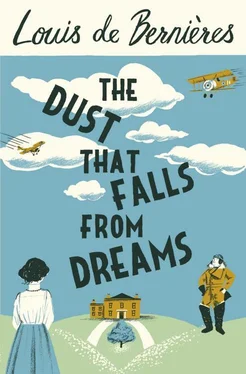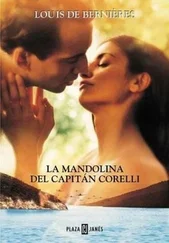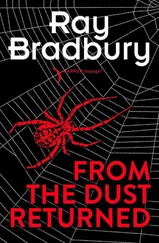The first man to write in it was Able Seaman Devonshire, who turned straight to the last page and wrote: ‘By hook or by crook I’ll be the last in this book.’ G. Grimble of the Machine Gun Corps wrote: ‘When on this book you look, when on this book you frown, think of the one who spoiled your book by writing upside down.’ Private Shaw 12367 of the 1st Battalion Scots Guards left his address in the hope that Rosie would get in touch with him at a later date. Private Humphrey 2021, 3rd Battalion the Queen’s Regiment, stuck a small photograph of himself into the book. He decorated a whole page with writing that looked as if it were done in relief. He did it with his left hand.
Lieutenant Collier of the Yorks and Lancs drew an elaborate cartoon of some German soldiers being frightened by tanks. A. Hilberry of the Inniskilling Dragoons drew a cartoon of a sailor and a bulldog, and Private Francis Love in hut 19 drew some brooms and a carpet sweeper, subtitled ‘Some Mine Sweeping Equipment’. Bombardier Hood drew an ivy tendril in flower, very beautifully. Master Sergeant Montgomery of the 4th CMR wrote:
Think of me when you are lonely,
Cast on me one little thought,
In the depths of thine affection,
Plant one sweet forget-me-not.
You are my friend, my friend forever,
You may change but I will never.
Though separation is our lot,
Dear Old Pal forget me not.
12767 Joseph Webber of the 2nd Suffolks stuck in a photograph of himself straddling a chair backwards, with his arms resting on the back. He drew an immaculate picture of his cap badge, and wrote:
The best of luck I wish for thee,
The best of all good things,
The best of happiness and joy
That fortune ever brings.
Private Edwards of the 14th Battalion Durham Light Infantry, wounded at Ypres.
‘May your life be free from sorrow and care, may fortune always attend you, and may your days be filled with happiness is the sincere wish of Wm. J. Allen, 2nd CMR BC Canada.’
V. Buxton wished VAD Nurse McCosh the best of good luck from her little Aussie, and wrote a strange rhyme about a kangaroo that she couldn’t decipher.
Another little Aussie, Pte ME Obrien of the AIF, wrote:
The Netley Red Cross Hospital is the first that I’ve been in,
And the way that we’ve been treated, I’ll long to be back again.
Though you may be wounded badly, there is no cause to fear,
For you’re sure to recover quickly with the nurses they have here.
Although Australia’s far away across the briny sea,
I’ll not forget the hospital where the nurses were so kind to me.
Impressed by his own talent, he wrote ‘Some poem!’ obliquely across the bottom of the page.
The waggish HM of hut 19 wrote:
Mary had a little lamp,
It was well trained no doubt,
For every time her sweetheart called,
That little lamp when out.
At Christmas 1916 Sergeant J. J. Hennessey of the Rifle Brigade (Prince Consort’s Own) reflected that: ‘As the stormiest days frequently end in the most gloriest sunset, so we hope and pray that out of this time of sorrow and strife may issue a nobler and better world than has been yet.’
148928 MTASC, EAEF wrote:
Little dabs of powder, little daubs of paint,
Make a girl’s complexion look just what it ain’t.
Rifleman Frank Neale of the Post Office Rifles wrote out all of Portia’s speech about mercy, from memory.
On and on they went for three volumes, the rhymes, cartoons, reflections, words of gratitude, some beautifully done, some semi-literate, all sincere. As her life went by Rosie spent many hours alone with her autograph books, remembering the cheerful young men in the photographs, trying to picture those whose images had been slowly fading, admiring the immense talent of common soldiers from all over the Empire who could paint immaculate pictures of flowers or dogs, or bottles of whisky. To her they remained as young and cheerful as they had been back then, frozen in time by fond memory as old lovers are. These wounded young men who had left traces of their spirit in ink and pencil, verse and adage, were signals of the time in her life when she had been doing the most important things it would ever befall her to do, when experience was most intense, when the immensity of her grief and exhaustion made the plasticity of the world shimmer before her eyes like the heat haze on a summer road, when the whole universe seemed to smell of carbolic and Lysol and surgical spirit.
The contribution to which she unfailingly returned was the entry by Private J. C. Grundie of the Argyll and Sutherland Highlanders, who had taken a particular shine to her because she was half Scottish. On 9 April 1918 he drew a picture of a young woman wearing a sun hat, with a trug basket in the crook of her arm, and a rake over her shoulder. Behind her was a picture of a steamer and a submarine, and from each corner of the page grew tufts of what looked like tropical fern. In the middle of these surreal juxtapositions he had written, in tiny italic script:
When the war is done we’ll recall the fun –
The fun that conquered the pain –
For we’ll owe a debt (and we’ll not forget)
To the jokes that kept us sane:
How the wounded could laugh and bandy their chaff
And kick up a deuce of a row!
It may be in peace, when the sufferings cease,
We’ll be sadder, aye sadder, than now.
Rosie learned these prophetic words by heart, and hoped that for Private J. C. Grundie she too would remain forever young, with chestnut hair on her head, freckles on her face, and so much grief to cope with that she smothered it in work, and kindliness, and jokes.
44. The Metamorphosis of Mrs McCosh (1)
MRS MCCOSH ADORED Folkestone. Every Whitsun she travelled down by train from Victoria to stay with her friend Myrtle, who liked to style herself Mrs Henry Cowburn, after the fashion of the day. Mrs Henry Cowburn lived in a dilapidated four-bedroomed house not far from Little Switzerland with her husband, a former yeomanry officer and local solicitor, who was infinitely more interested in playing golf than in practising law, and liked to play with Mr McCosh whenever he had reason to come up to London, and with Mrs McCosh when she came down to visit his wife. He had served in the South African war and his intestines had never quite recovered from the dysentery that had nearly killed him, and had, indeed, done for most of his comrades far more efficiently than the guerrilla tactics of the Boers. Before setting off to the golf course he would take great pains to ensure that nothing gastrointestinal was likely to happen to him. Fortunately the green of the ninth was near the clubhouse, and he could usually manage until then. He ate prodigious quantities of eggs and bacon, in the belief, current at the time, that they had a binding effect. This diet certainly made an outdoor life in some ways preferable, but now that eggs were fivepence and bacon was one and eight, he had discovered to his delight that a more normal diet actually improved the state of his bowels.
Folkestone had been greatly changed by the war, at first becoming somewhat dismal. It had been designated a prohibited area because of its proximity to France and its vulnerability to naval bombardment. All the Austrian and German waiters had been interned, and the hotels and boarding houses had fallen into desuetude. The Metropole and the Grand were barely ticking over, and the band no longer played its exuberant music on the Leas. The young men had gone into the navy or the Buffs, and their place had been taken by abject Belgian refugees, with their tales of atrocity and rape, and their hopeless penury. Myrtle was on the Committee for Belgian Refugees, and her three spare rooms were taken by three elderly musicians from the same orchestra who had all fled together. Her house was filled with melancholy chamber music played on borrowed instruments that were not nearly as good as the ones they had had to leave behind, as they often reminded her. On three days a week she manned the soup kitchens at the fishmarket. Major Cowburn was on the Emergency Committee, and was one of those in charge of destroying anything useful to the enemy in the event of invasion. He had a list of everything useful in the town, and detailed plans as to how to destroy it. In his garden he had prepared a large ziggurat of kindling so that a bonfire might be lit at short notice.
Читать дальше












